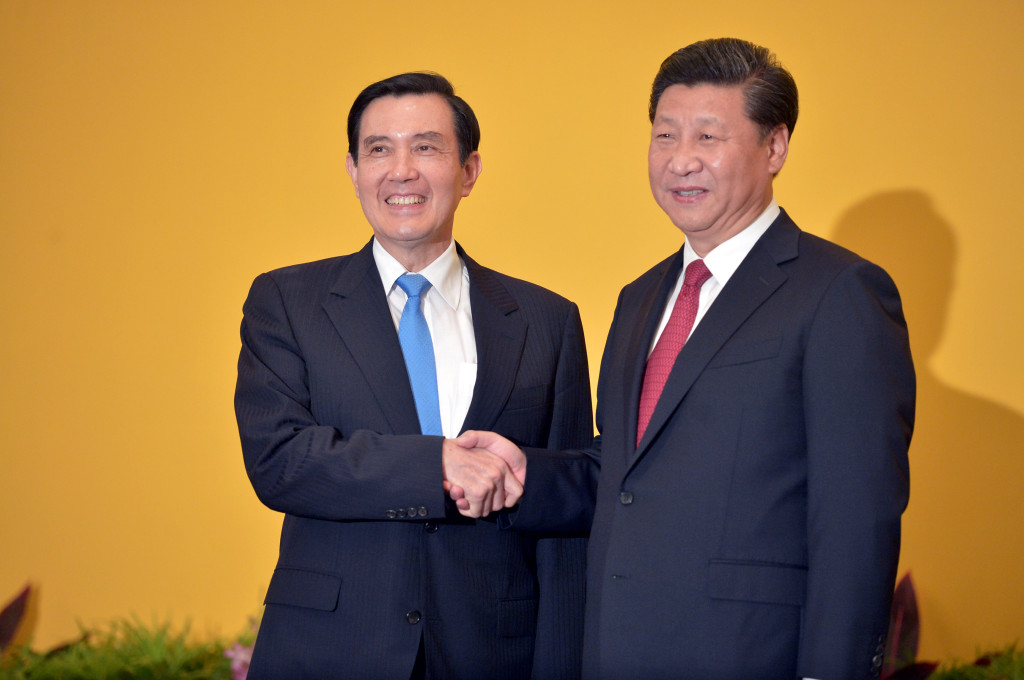
As far as Taiwanese public opinion goes, the relatively pro-Chinese stand of president Ma Ying-jeou (馬英九) has been a disaster, especially in his second term.![]()
![]()
When he leaves office early next year, Ma will do so as one of the most unpopular Taiwanese leaders in memory, stirring a popular revolt last year among Taiwanese citizens who believe his government has been too quick to cozy up to Beijing. The student-led ‘Sunflower movement’ protests so rattled Ma’s government that he abandoned what he hoped would become one of his administration’s most important policy achievements — the Cross-Strait Service Trade Agreement, which would have liberalized many service sectors between mainland China and Taiwan, including tourism, finance and communications. Though Ma concluded negotiations with Beijing over the CSSTA, the Taiwanese parliament still hasn’t ratified the agreement.
* * * * *
RELATED: Taiwan watches battle of wills
between Beijing and Hong Kong
* * * * *
Ma’s decision to meet with Chinese president Xi Jinping (习近平) today is not necessarily a popular decision back home — and its swift announcement earlier this week was a bombshell in the campaign for Taiwanese elections just nine weeks away.
With just months left in office, his ruling party, the Kuomintang (KMT, 中國國民黨), is far behind in the presidential race. For the first time in Taiwan’s history, the Kuomintang and its allies that form the Pan-Blue Coalition could lose control of Taiwan’s parliament. The Kuomintang’s first presidential candidate, Hung Hsiu-chu (洪秀柱), the vice president of the Legislative Yuan (立法院), Taiwan’s unicameral legislature, sunk so low in polls since becoming the KMT presidential nominee in July that the party dumped her last month. Her replacement, Eric Chu (朱立倫), the party chairman and, since 2010, the mayor of New Taipei, is gaining little traction.
Neither Ma nor Xi are expected to announce any new policies or make any joint statements as a result of the meeting taking place today at Singapore’s Shangri-La Hotel, on ‘neutral’ ground. That’s not necessarily a problem, though, because the fact that the two are meeting on (relatively) equal — Ma as the head of the Kuomintang and Xi as the head of the Chinese Communist Party (CCP, 中国共产党) — is historic in its own right.
Given that so much of Ma’s unpopularity stems from his pro-China stand, his meeting today in Singapore may well doom the Kuomintang’s chances entirely in January’s general election. Indeed, the party’s low standing in public opinion may have made it eaiser for Ma to engage Xi. The near-certainty of losing power might have liberated Ma toward a historic meeting that will almost certainly have long-term benefits for better cross-straits relations.
In one sense, Ma’s position follows naturally from the force of economic gravity — 27% of Taiwan’s exports now go to China, and another 13% go to Hong Kong. Direct flights between Taipei and Beijing are now commonplace, trade continues to rise and mainland tourists are no longer a rare sight. Though Taiwan has the world’s 19th largest economy and incomes are far higher in Taiwan than on the mainland, China’s growing economic prowess (even as it may be headed into recession) is simply a matter of fact. Among the issues Ma expected to raise with Xi: a direct hotline between Taipei and Beijing, greater cooperation from Beijing in dealing with Taiwan’s murky international status and Xi’s change of heart in inviting Taiwan to join the Beijing-led Asia Infrastructure Investment Bank that Xi formed last year as a counterweight to US-dominated global financial institutions.
Xi, a ‘princeling’ whose father was a top Party official, is expected to head the mainland Chinese government through 2022, has more thoroughly dominated the CCP than any leader since perhaps Mao Zedong, waging a widespread campaign against corruption within the Party that has snared so many top officials that critics argue it functions as a purge of Xi’s internal rivals. Fresh off meetings to design China’s next five-year economic program, Xi’s government has been particularly aggressive, if not successful, about ameliorating economic headwinds, including failed efforts to stop a Chinese stock market crash over the summer. Two weeks ago, China formally ended its ‘one-child’ policy, and Xi’s government has worked with the United States to establish goals to reduce Chinese (and global) carbon emissions in the next two decades, plans that will take center stage at the international summit on climate change next month in Paris.
Nevertheless, the Chinese economy faces a difficult patch as its working population ages and it transitions from top-down growth built on internal improvements and an economy based on manufactured exports produced mainly along China’s dense eastern coast. Politically, Xi has gradually cracked down on dissent and tightened internal controls on Internet freedom. Nevertheless, he faces an angry Hong Kong population that has demanded a greater voice in choosing who will be eligible to stand for chief executive in 2017. Relations between Beijing and China’s western ethnic communities, such as the Uyghurs and the Tibetans, are still strained. The last thing Xi wants is a reversal of Beijing’s gains with Taiwan since 2008. It’s been Xi (and not Ma) who has resisted a meeting in the past; Xi’s accession to today’s meeting reflects that growing economic ties alone are not enough to secure those gains.
In local elections last year, the Kuomintang suffered defeats nationwide, including the Taipei mayoral elections, where an independent candidate, Dr. Ko Wen-je (柯文哲), a respected surgeon, easily took power with the support of the opposition Democratic Progressive Party (DPP, 民主進步黨). The losses were so severe that Taiwan’s prime minister stepped down. Those losses seem likely to multiply on January 16, when the DPP seems likely to win the presidency for just the second time in Taiwanese history. Continue reading Ma-Xi meeting takes place with Kuomintang’s political woes looming